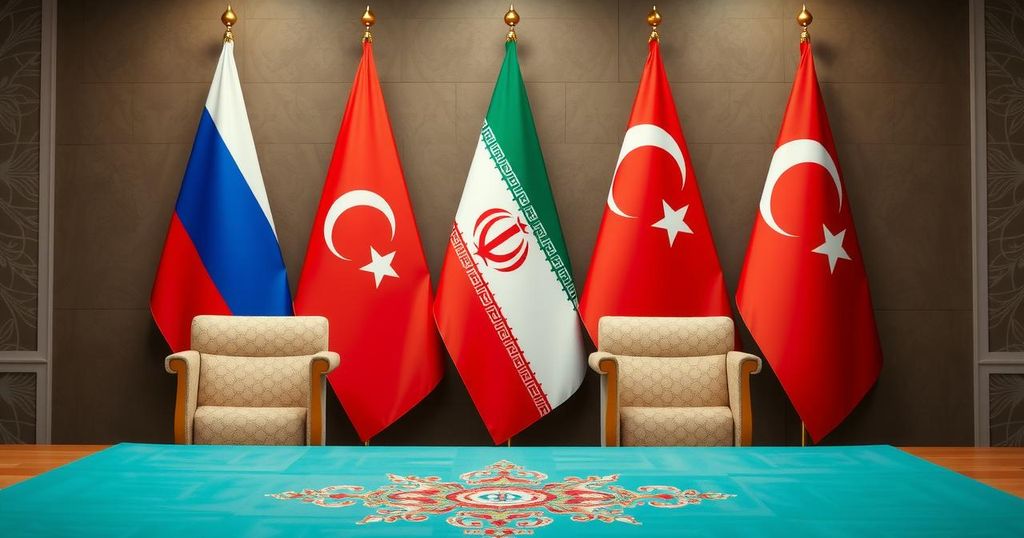World news
AGENCE FRANCE - PRESSE, ASIA, BASHA, BASHAR AL - ASSAD, CONFLICT, ERDOGAN, EUROPE, EUROPE/ASIA, FIGHTER JETS, HA, HAKAN FIDAN, HAMA, IRAN, MILITARY, REC, REUTERS, RUSSIA, SYRIA, SYRIAN CIVIL WAR, SYRIAN CONFLICT, SYRIAN NATIONAL ARMY, U. S. - BACKED SYRIAN DEMOCRATIC FORCES, UKRAINE, WAR
Li Chen
0 Comments
Turkey, Russia, and Iran to Discuss Syrian War Amid Rebel Gains
Turkey, Russia, and Iran are set to meet in Qatar amid significant rebel advances in Syria, specifically by HTS, who have captured key territories. The talks will focus on stabilizing the situation following a reset in the power dynamics favoring the opposition. Turkey’s concerns regarding Kurdish sovereignty also remain a focal point as the Syrian civil war approaches its thirteenth year.
Turkey, Russia, and Iran are convening this weekend in Qatar to address the recent gains made by rebel forces that have altered the dynamics of Syria’s prolonged civil war. The meeting will coincide with the annual Doha Forum, engaging high-level delegates from various sectors. Turkey’s Foreign Minister Hakan Fidan will participate alongside his Russian and Iranian counterparts, continuing the dialogue initiated under the Astana process, aimed at establishing a political resolution to the conflict.
Since its inception in 2017, the Astana process has sought to minimize hostilities and has witnessed significant milestones, including a ceasefire brokered by Russia and Turkey in 2020. However, the recent offensive by the Islamist group Hayat Tahrir al-Sham (HTS), who captured Aleppo and Hama, thereby threatening Homs, has consolidated their position, challenging the control previously exercised by the Assad regime.
In light of these developments, President Vladimir Putin has emphasized to Turkish President Recep Tayyip Erdogan the need to restore stability in Syria, while Erdogan has reiterated Turkey’s support for Syria’s territorial integrity. The situation remains tense as Turkey, opposed to any Kurdish sovereignty in northeastern Syria, continues to support the Syrian National Army against the U.S.-backed Syrian Democratic Forces (SDF).
Moreover, the geopolitical landscape has shifted due to distractions faced by Russia amid its own military endeavors in Ukraine, alongside Iran’s weakened status following recent conflicts involving its allies in the region. Experts suggest that while these rebel advances could prompt Assad and his supporters to negotiate, significant external backing for his regime remains firm.
Amidst the ongoing conflict, the United States maintains its presence, with approximately 900 troops supporting the SDF against ISIS threats. The current instability has raised concerns regarding potential refugee surges, a point of anxiety for Turkey and American strategists alike.
As international dialogue progresses, a ceasefire and stabilization efforts will be crucial to mitigate further humanitarian crises and geopolitical ramifications in the region.
Recent remarks by former officials underscore the significance of Aleppo’s control and the implications for broader U.S. interests in the region, particularly with the rise of ISIS being a resurgent threat that needs immediate attention.
The Syrian civil war, which has persisted for over a decade, has seen multiple factions and international actors vying for influence and control. The involvement of Russia, Iran, and Turkey through the Astana process represents a significant multinational effort to broker peace in a complex and volatile environment. The recent military advancements by HTS illustrate the ongoing volatility of the situation, complicating diplomatic efforts. Furthermore, the strategic interests of these countries in maintaining territorial integrity and influence demonstrate the intricate balance required in the Middle East’s geopolitical arena.
The upcoming trilateral talks in Qatar underscore the urgency of addressing the shifting alliances and power dynamics within the Syrian conflict. The persistent military gains by rebel groups present a formidable challenge to the Assad regime and its allies, necessitating a recalibrated approach to conflict resolution. As the situation continues to evolve, maintaining stability will require careful negotiation, particularly against the backdrop of a potential resurgence of ISIS. The international community’s role remains critical in facilitating dialogue that prioritizes humanitarian concerns and political solutions in Syria.
Original Source: www.voanews.com




Post Comment